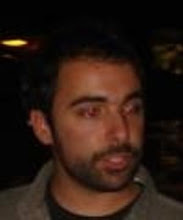
My first encounter with the children occurs in downtown Ramallah, where they are trying to make a couple shekels selling gum. One of them is extremely aggressive in his salesmanship: I had bought a stick of gum from another child for 1 shekel, so I assume that that price is what this aggressive little entrepreneur wants for his gum as well. So I quickly give him a shekel and take a stick of gum so as to pacify him. I walk away with the group and about 2 minutes later, the boy confronts me and yells “I told you 5 shekels!” He tries to intimidate me so I yell at him in Arabic to “Get the hell out of here.” The sternness indeed works and the child went away, only to abruptly encounter me again later on that day. These children are truly audacious and the harsh realities of their daily lives seem to have made them fearless.
My second and indeed more emotional encounter with refugee children occurs during our excursion at the Qalandia, the main Israeli checkpoint between Ramallah and Jerusalem. Upon our arrival at the line of Palestinian cars waiting in front of the checkpoint, we receive a cold welcome from some children hanging out in the rubble beneath the separation barrier, or apartheid wall. One of them wears an angry grin on his face, and another hurls a stone at our vehicle. One could tell that they are angry at us as Western tourists, who are able to cross the checkpoint within a couple of minutes, while these boys are stuck wistfully on the other side. Hence, when we actually disembark from the bus, we are in for a treat. The refugee boys at the checkpoint, as the ones in Ramallah proper, are selling cheap gum in order to make a couple of shekels. They are too pushy to a point where they begin harassing members of our group who are unwilling to purchase their gum.
One of our group members is nice enough to offer them money. However, I tell her not to give the money to the kids because they are acting like little brats. Doing this, I had successfully diverted the little thugs’ attention away from the rest of the group and towards me. One of them yells at me desperately, “Why did you not let her give us money?!” and punches me in the back. Sternly, I yell back at him in Arabic and tell him that it is shameful to beg for money, especially from guests in our country. I tell them that I, like them, am Palestinian and that the members of this group are my friends. Once they realize that I am one of their compatriots, they begin to warm up. I embrace two of the boys; both could not have been more than 10 years old, in each arm and attempt to calm them from their rage. Subsequently, one could sense the shame that they hold for their initial behavior. They are not taught to act like angry little thugs, like beggars. This is indeed considered shameful in our culture. But these little boys are hungry and desperate for money, something which can turn even the best-behaved child into an angry little savage.
Hence I embrace these children, my Palestinian brothers, and calm them. They are my people, and I love them. I need to see through their anger and their desperation in order to realize this. And in the end, I give them what is left of the coins in my pocket. I hold my hand high and drop my coins, for they had jumped at my hand like a flock of seagulls eager for a bite to eat. The youngest boy is left empty handed, for his two older friends catch the change first. He cries for me to give him some change. I tell him that I had given it all away and then I look at his friend. They resemble each other and I asked if he is his brother, which he affirms. I tell him to give some of the money to his little brother. He nods reassuringly and I turn away and walk towards the checkpoint in order to catch up with the rest of the group.
Whether or not that boy gave his younger brother a portion of the money which I had given them, I cannot say. These boys are being tested as are no other boys their age. They are allegorically linked to the whole of Palestinian society, which like them, is strangled into anger and desperation. I cannot blame these children for their bad conduct, for they are hungry and downtrodden. Nor can I blame the Palestinian people for the behavior resulting from their indignation at the injustice brought upon them by the Israeli occupation. There is an underlying cause beneath every desperate action which surfaces, and few times have I analyzed this concept more than in my encounter with the refugee children.
I had indeed dealt sternly with these children, for this is the language that they are used to and sadly, the language which they understand. However, after the event my sternness melted away, and I could not sleep that night. For me not to feel sorrow for these children would be a betrayal of my people, and a betrayal to humanity. Hence I wept, out of the deep sadness which engulfed my heart, and prayed for justice to be brought to these downtrodden siblings of mine.
-Isaac Kassis

